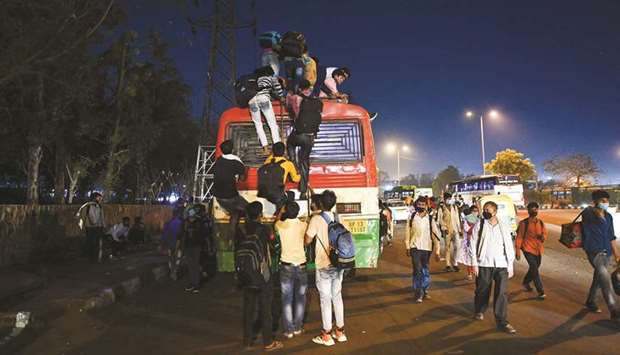India will let all citizens over 18 have Covid-19 vaccinations from May 1, the government said yesterday, as the health system creaked under the weight of record-high cases and the capital region of New Delhi ordered a lockdown.
Facing growing criticism over its handling of the second wave of the pandemic, Prime Minister Narendra Modi’s administration said vaccine manufacturers would have to supply 50% of doses to the federal government and the rest to state governments and the open market at a pre-declared price.
Daily Covid-19 cases in India jumped a record 273,810 yesterday, and deaths rose a record 1,619 to 178,769.
Hospitals have a shortage of beds, oxygen and key medicines, and infections have passed 15mn, the world’s second highest total after the US.
The New Delhi region ordered a six-day lockdown starting yesterday night after its chief minister said the health system was unable to take more patients in big numbers.
“If a lockdown isn’t implemented now, the situation will go beyond control,” Chief Minister Arvind Kejriwal told a virtual media briefing yesterday.
Criticism of Modi’s administration has increased as he continued to address large state election rallies and let Hindus congregate for a festival.
Kejriwal had said on Sunday that fewer than 100 critical care beds were available in the city of New Delhi, which has a population of more than 20mn people, and social media were flooded with complaints.
New Delhi joined 13 other Indian states that have decided to impose restrictions, curfews or lockdowns in their cities, including the richest state of Maharashtra and Modi’s home state of Gujarat, where the industrial city of Ahmedabad is also grappling with a shortage of beds.
Hong Kong said late on Sunday that the Asian financial hub will suspend flights from India, Pakistan and the Philippines from today for two weeks.
Britain has put India on a travel “red-list” and Prime Minister Boris Johnson cancelled a planned trip to India next week.
As of yesterday, India had administered nearly 123.9mn vaccine doses — the most in the world after the US and China, though it ranks much lower in per capita vaccination.
The current vaccination process is controlled by the federal government.
Liberalising it would augment vaccine production and availability, and attract new domestic and international vaccine manufacturers, the government said in its statement.
Meanwhile, the government has approved a Rs45.67bn ($610mn) grant for Covid-19 vaccine makers Serum Institute of India (SII) and Bharat Biotech to boost production capacity, the finance minister said.
Of the total, SII, the world’s biggest maker of vaccines including the AstraZeneca shot, will get Rs30bn rupees ($400mn), Nirmala Sitharaman told news channel CNBC-TV18 yesterday.
SII sought the funds to increase its monthly capacity to more than 100mn doses by the end of May, from up to 70mn currently.
“We are clear that we will give whatever support is necessary to develop and boost the availability of vaccines in the country,” a government source said, declining to be named as he was not authorised to speak publicly on the matter.
Government ‘set to waive’ 10% import duty
India will waive its 10% customs duty on imported Covid-19 vaccines, a senior government official said yesterday, as the government tries to boost supplies to counter a dramatic surge in coronavirus cases. Imports of Russia’s Sputnik V vaccine are due to arrive soon and the government has also urged Pfizer, Moderna and Johnson and Johnson to sell their products to India. The official, who declined to be named, also said the government was considering allowing private entities to import approved vaccines for sale on the open market without government intervention. They could also be given the freedom to set pricing, he added. The government currently regulates the sale and purchase of all Covid-19 shots in the country. A finance ministry spokesman did not immediately respond to an e-mail seeking comment outside business hours. Other South Asian countries, including Nepal and Pakistan, as well as Latin American nations such as Argentina and Brazil levy vaccine import tariffs ranging between 10% and 20%.

